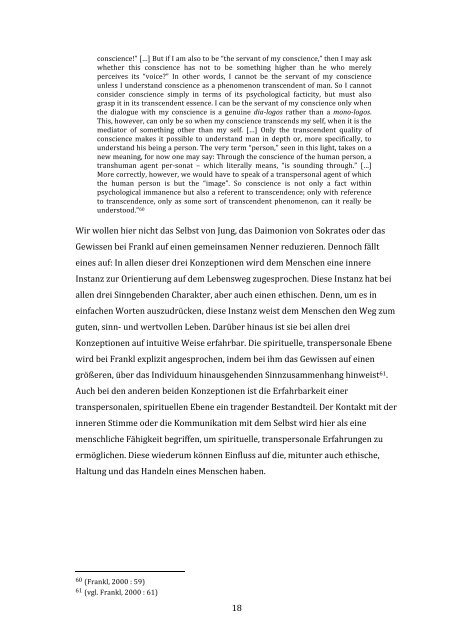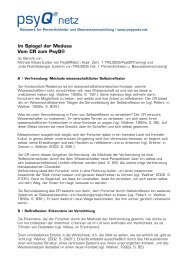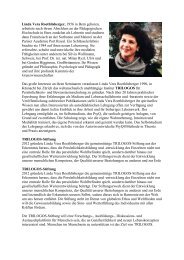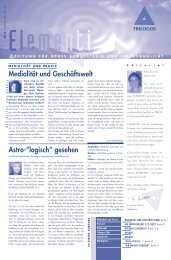IQ+EQ+SQ=PsyQ - die integral emergente Intelligenz - TRILOGOS
IQ+EQ+SQ=PsyQ - die integral emergente Intelligenz - TRILOGOS
IQ+EQ+SQ=PsyQ - die integral emergente Intelligenz - TRILOGOS
Sie wollen auch ein ePaper? Erhöhen Sie die Reichweite Ihrer Titel.
YUMPU macht aus Druck-PDFs automatisch weboptimierte ePaper, die Google liebt.
conscience!” […] But if I am also to be “the servant of my conscience,” then I may ask <br />
whether this conscience has not to be something higher than he who merely <br />
perceives its “voice?” In other words, I cannot be the servant of my conscience <br />
unless I understand conscience as a phenomenon transcendent of man. So I cannot <br />
consider conscience simply in terms of its psychological facticity, but must also <br />
grasp it in its transcendent essence. I can be the servant of my conscience only when <br />
the dialogue with my conscience is a genuine dialogos rather than a monologos. <br />
This, however, can only be so when my conscience transcends my self, when it is the <br />
mediator of something other than my self. […] Only the transcendent quality of <br />
conscience makes it possible to understand man in depth or, more specifically, to <br />
understand his being a person. The very term “person,” seen in this light, takes on a <br />
new meaning, for now one may say: Through the conscience of the human person, a <br />
transhuman agent per‐sonat – which literally means, “is sounding through.” […] <br />
More correctly, however, we would have to speak of a transpersonal agent of which <br />
the human person is but the “image”. So conscience is not only a fact within <br />
psychological immanence but also a referent to transcendence; only with reference <br />
to transcendence, only as some sort of transcendent phenomenon, can it really be <br />
understood.” 60 <br />
<br />
Wir wollen hier nicht das Selbst von Jung, das Daimonion von Sokrates oder das <br />
Gewissen bei Frankl auf einen gemeinsamen Nenner reduzieren. Dennoch fällt <br />
eines auf: In allen <strong>die</strong>ser drei Konzeptionen wird dem Menschen eine innere <br />
Instanz zur Orientierung auf dem Lebensweg zugesprochen. Diese Instanz hat bei <br />
allen drei Sinngebenden Charakter, aber auch einen ethischen. Denn, um es in <br />
einfachen Worten auszudrücken, <strong>die</strong>se Instanz weist dem Menschen den Weg zum <br />
guten, sinn‐ und wertvollen Leben. Darüber hinaus ist sie bei allen drei <br />
Konzeptionen auf intuitive Weise erfahrbar. Die spirituelle, transpersonale Ebene <br />
wird bei Frankl explizit angesprochen, indem bei ihm das Gewissen auf einen <br />
größeren, über das Individuum hinausgehenden Sinnzusammenhang hinweist 61 . <br />
Auch bei den anderen beiden Konzeptionen ist <strong>die</strong> Erfahrbarkeit einer <br />
transpersonalen, spirituellen Ebene ein tragender Bestandteil. Der Kontakt mit der <br />
inneren Stimme oder <strong>die</strong> Kommunikation mit dem Selbst wird hier als eine <br />
menschliche Fähigkeit begriffen, um spirituelle, transpersonale Erfahrungen zu <br />
ermöglichen. Diese wiederum können Einfluss auf <strong>die</strong>, mitunter auch ethische, <br />
Haltung und das Handeln eines Menschen haben. <br />
<br />
<br />
<br />
<br />
<br />
<br />
60 (Frankl, 2000 : 59) <br />
61 (vgl. Frankl, 2000 : 61) <br />
18











